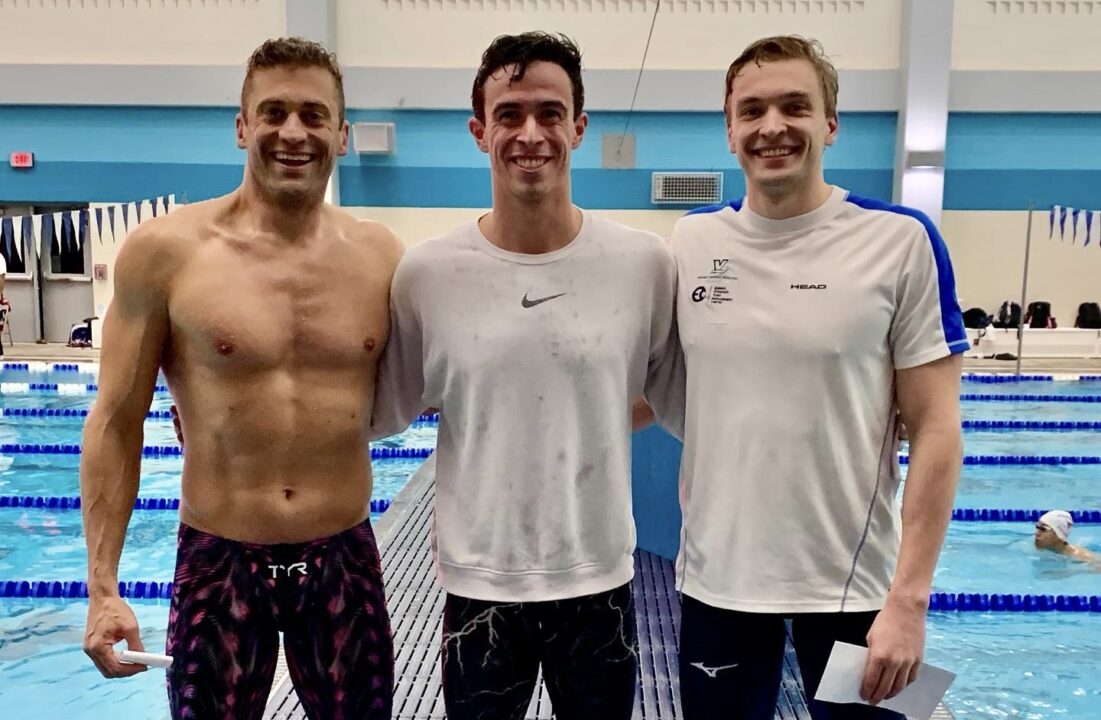courtesy of James Fike, Founder and CEO of Fike Swim
Before we get going, check out and subscribe to the Less Is More vlog for more detail on everything below.
21 years ago I qualified for my last US Nationals. It was an abysmal performance- second-to-last in the 200 breast and not much better in the 100. I remember my grandmother, who was a bit feisty, telling me “Well, you can’t tell me you’ve been training.” My college career ended the following spring on a similarly low note with times slower than freshman year. It was gut wrenching to go out like that.
But at the KMSC ProAm two weeks ago I rallied from a poor 100 breast and a pulled calf in the prelims of the 200 breast to qualify for another US Nationals at the age of 41 with a 1:57.11 in the 200 breast! It took 18 years of failing to find the right path, which sounds a little crazy when you say it like that, but it’s been worth it.
Here are the things I worked on to keep the best times coming:
FUNCTIONAL STRENGTH TRAINING:
So Far…Prior to September, all of my strength training was about moving maximum weight, which means slow and heavy, and working the whole body three days a week. But after struggling to get speed and finish races this summer, I needed a change to have any chance at qualifying for the absurdly fast 2024 Trials. Bench pressing 330lbs is nice but more than is necessary. So with the help of a strength coach, I began incorporating speed and resistance into my movements using bands and chains, and I switched to alternating lower body and upper body. Some of the movements remained the same, like deadlift and squats, but everything got tweaked, such as expanding deadlifts to include sumo and Romanian to help with specific parts of breaststroke or specific parts of a race. Bench press was a staple of my training but now occurs infrequently and my shoulders thank me.
Next Up…I want to incorporate more plyometric exercises like box jumps, med ball throws, kettle bell swings, and push up jumps. My push-offs and pullouts have improved so much, but the actual stroke is still struggling to be as explosive for a sustained period as I would like.
DIET & NUTRITION:
So Far…During the summer I enlisted the help of nutritionist Erica Beine, and it made a big impact. I was always skeptical when people raved about this food or that supplement, it seemed like nothing I ever did made a tangible impact. But there were several changes that either individually made a difference or cumulatively improved how I felt during practice and between practices.
- Hydration – upping my water intake to 125 ounces per day (half my body weight plus 20 in ounces).
- Daily Vitamin B to make up for deficiency and improve energy.
- Reducing dairy due to sensitivity.
- Pre-Workout for energy.
- Creatine for performance and recovery.
Next Up…I began the loading phase of using Beta Alanine immediately after the ProAm in the hopes of improving my ability to finish races.
SWIMMING
This remains the area I’m most dialed into. No garbage yardage. No sets for the sake of tradition, pride, or ego. I only train to race. Mondays, Wednesdays, and Fridays are simply skills and drills to warm up for weights and keep the feel, or about 700 meters. Tuesdays and Saturdays are high-intensity, short distance breaststroke work and Thursdays are moderate aerobic to improve lung capacity and flush the system. Most of those days are around 2,500-3,000 meters.
TAPERING
So Far…I kept the swimming taper the same- six weeks and that worked as well as ever. However, I also did a six-week taper in the weight room and that seems to be my biggest mistake in the last cycle. I had no speed in the 50 or 100. In the past, I’ve tapered that much but I was doing big lifts that were tearing down my muscles and requiring longer recovery. Functional strength training put a very different strain on my body and I could feel something was off during the fifth week of taper.
Next Up…I’ll keep the six-week swim taper but reduce the weight taper to about four weeks and keep just a little more intensity through to the meet.
Good luck with your training, SWIM DIFFERENT!
If you like this article and still want to know more, stay tuned to the Fike Swim:
About Fike Swim
“We design products exclusively for the toughest sport in the world. We unapologetically place swimmers on a pedestal. The rigors they embrace on a daily basis can only be understood by another swimmer and they deserve a company focused 100% on helping them succeed. Whether you’re just starting out or training for Paris, we stand behind you.”
-James Fike, Founder
Fike Swim Products was born when founder James Fike put a brick on top of a kickboard and transformed just another legs-only kick set into a total body workout felt into the next day. Since then it’s been our mission to create unique swim equipment with the single-minded goal of making you faster. We don’t sell toys. We create tools to help you reach your potential.
Fike Swim is a SwimSwam partner.

